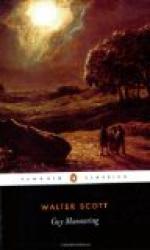As the fated and influential hour rolled on, the terrors of the hateful Presence grew more confounding to the mortal senses of the victim, and the knot of the accursed sophistry became more inextricable in appearance, at least to the prey whom its meshes surrounded. He had not power to explain the assurance of pardon which he continued to assert, or to name the victorious name in which he trusted. But his faith did not abandon him, though he lacked for a time the power of expressing it. ‘Say what you will,’ was his answer to the Tempter; ’I know there is as much betwixt the two boards of this Book as can ensure me forgiveness for my transgressions and safety for my soul.’ As he spoke, the clock, which announced the lapse of the fatal hour, was heard to strike. The speech and intellectual powers of the youth were instantly and fully restored; he burst forth into prayer, and expressed in the most glowing terms his reliance on the truth and on the Author of the Gospel. The Demon retired, yelling and discomfited, and the old man, entering the apartment, with tears congratulated his guest on his victory in the fated struggle.
The young man was afterwards married to the beautiful maiden, the first sight of whom had made such an impression on him, and they were consigned over at the close of the story to domestic happiness. So ended John MacKinlay’s legend.
The Author of Waverley had imagined a possibility of framing an interesting, and perhaps not an unedifying, tale out of the incidents of the life of a doomed individual, whose efforts at good and virtuous conduct were to be for ever disappointed by the intervention, as it were, of some malevolent being, and who was at last to come off victorious from the fearful struggle. In short, something was meditated upon a plan resembling the imaginative tale of Sintram and his Companions, by Mons. le Baron de la Motte Fouque, although, if it then existed, the author had not seen it.
The scheme projected may be traced in the three or four first chapters of the work; but farther consideration induced the author to lay his purpose aside. It appeared, on mature consideration, that astrology, though its influence was once received and admitted by Bacon himself, does not now retain influence over the general mind sufficient even to constitute the mainspring of a romance. Besides, it occurred that to do justice to such a subject would have required not only more talent than the Author could be conscious of possessing, but also involved doctrines and discussions of a nature too serious for his purpose and for the character of the narrative. In changing his plan, however, which was done in the course of printing, the early sheets retained the vestiges of the original tenor of the story, although they now hang upon it as an unnecessary and unnatural incumbrance. The cause of such vestiges occurring is now explained and apologised for.
It is here worthy of observation that, while the astrological doctrines have fallen into general contempt, and been supplanted by superstitions of a more gross and far less beautiful character, they have, even in modern days, retained some votaries.




